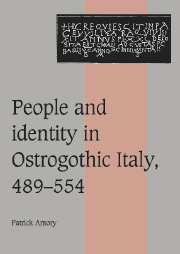Book contents
- Frontmatter
- Contents
- Preface
- List of rulers
- Terminology and vocabulary
- List of abbreviations
- Map of Ostrogothic Italy
- Introduction: Studying the barbarians in late antiquity
- 1 Ethnicity, ethnography and community in the fifth and sixth centuries
- 2 The Ravenna government and ethnographic ideology: from civilitas to bellicositas
- 3 Individual reactions to ideology I: names, language and profession
- 4 Complementary and competing ideals of community: Italy and the Roman Empire
- 5 Individual reactions to ideology II: soldiers, civilians and political allegiance
- 6 Catholic communities and Christian Empire
- 7 Individual reactions to ideology III: Catholics and Arians
- 8 The origin of the Goths and Balkan military culture
- Conclusion
- Appendix 1 The inquiry into Gundila's property: a translation and chronology
- Appendix 2 The Germanic culture construct
- Appendix 3 Archeological and toponymic research on Ostrogothic Italy
- Appendix 4 Dress, hairstyle and military customs
- Prosopographical Appendix: A prosopography of Goths in Italy, 489–554
- Bibliography
- Index
- Cambridge Studies in Medieval Life and Thought Fourth Series
- Frontmatter
- Contents
- Preface
- List of rulers
- Terminology and vocabulary
- List of abbreviations
- Map of Ostrogothic Italy
- Introduction: Studying the barbarians in late antiquity
- 1 Ethnicity, ethnography and community in the fifth and sixth centuries
- 2 The Ravenna government and ethnographic ideology: from civilitas to bellicositas
- 3 Individual reactions to ideology I: names, language and profession
- 4 Complementary and competing ideals of community: Italy and the Roman Empire
- 5 Individual reactions to ideology II: soldiers, civilians and political allegiance
- 6 Catholic communities and Christian Empire
- 7 Individual reactions to ideology III: Catholics and Arians
- 8 The origin of the Goths and Balkan military culture
- Conclusion
- Appendix 1 The inquiry into Gundila's property: a translation and chronology
- Appendix 2 The Germanic culture construct
- Appendix 3 Archeological and toponymic research on Ostrogothic Italy
- Appendix 4 Dress, hairstyle and military customs
- Prosopographical Appendix: A prosopography of Goths in Italy, 489–554
- Bibliography
- Index
- Cambridge Studies in Medieval Life and Thought Fourth Series
Summary
Ethnographic discourse did not merely describe society: it attempted to order and reorder it. This reordering succeeded in creating something different from ethnicity: political opportunities that vanished as soon as they appeared. The many uses of ethnographic discourse in fifth- and sixth-century Italy evolved over periods of time, and conflicted with each other and with non-ethnographic ways of imagining community. The words “Goth” and “Roman,” redefinable as they were, could never fully describe or reorder a society far more complex than a division into two groups. Although some people attempted to fit themselves into the historically received categories of Goth and Roman in different ways at different times, in the end neither of these categories succeeded in constructing a meaningful or permanent community. Rather, they succeeded in changing individual behavior briefly, introducing new routes to political power for the ambitious, and destroying the lives of those who could not take advantage of them.
In Ostrogothic Italy, the words of the powerful weighed heavily on people's necks. Ideology did not float away, unnoticed, into the air. Everyone was surrounded by the marks and pressures of officialdom, the demands of the priest, the magistrate, the tax collector and the general. A lengthy ceremony surrounded even the request to enter the judge's office to present a petition. At the end of a case judged in his favor, a relieved curialis said “limitless thanks” and the court notary duly set down his words in the record.
- Type
- Chapter
- Information
- People and Identity in Ostrogothic Italy, 489–554 , pp. 314 - 320Publisher: Cambridge University PressPrint publication year: 1997



